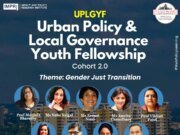Press Release
Shivashish Narayan
The IMPRI Center for Work and Welfare (CWW), IMPRI Impact and Policy Research Institute, New Delhi, hosted an interactive panel discussion on “Employment, Livelihoods, and Union Budget 2025-26” on February 3, 2025 (Monday) at 3:00 p.m. IST under IMPRI’s 6th Annual Series of Thematic Deliberations and Analysis of Interim Union Budget 2025-26, as part of IMPRI.
The Chair & Moderator of the session Prof Suchita Krishnaprasad, Visiting Professor, IMPRI; Former Associate Professor and Head of the Dept of Economics, Elphinstone College, Mumbai provided key insights into the budget’s economic implications, emphasising education, healthcare and labour reforms. She also highlighted global economic challenges, investment trends and policy expectations, fostering an engaging discussion among experts from academia, journalism and advocacy.
Agricultural Employment and Rural Livelihoods
Prof Sarthi Acharya, Professor (Delhi Chair), Institute for Human Development, New Delhi; Former Director, Institute of Development Studies (IDS), Jaipur emphasized the budget’s focus on agricultural development, including provisions for pulses, high-yield seed varieties and credit support for farmers. While these measures could boost the sector, long-term investments in infrastructure and policy coherence between fiscal and monetary strategies were deemed crucial.
He also addressed industrial employment, the need for skill development and India’s manufacturing potential. Concerns were raised over high borrowing costs for industries and the lack of large-scale production capacities in sectors. He mentioned the necessity of a long-term vision for employment generation, technological advancement and human capital development to ensure sustained economic growth.
Migration, Informal Work and Urban-Rural Employment Gaps
Prof S Irudaya Rajan, Chair, International Institute for Migration and Development, India stressed the urgency of aligning policies with India’s migration dynamics. Highlighting rural-urban disparities, he urged strategic employment interventions beyond cities, noting that migrants often return to villages due to urban job insecurity. While allied sectors like livestock and fisheries show rural employment potential, existing schemes fail to ensure sustainable incomes, necessitating stronger rural policies. On international migration, he flagged skill gaps driving low-skilled workers abroad and advocated structured frameworks to enhance labour mobility. Bridging skill deficits and securing decent opportunities, he argued, requires integrated strategies for internal and global migration to bolster economic stability and equitable growth.
The Crisis of Wages and Informal Labour
Mr Sandeep Chachra, Executive Director, ActionAid Association, India and Ex Co-Chair, World Urban Campaign, UN-HABITAT; Advisor, IMPRI critiques India’s economic narrative arguing it obscures deepening distress in employment and wages. Highlighting declining real wages, he notes self-employed women suffered a 20% earnings drop with widening gender wage gaps undermining gender parity efforts. He questions the budget’s middle-class focus dismissing the 78.5 lakh job-creation target by 2030 as unrealistic amid reduced capital expenditure (₹1 lakh crore cut), which weakens infrastructure-led employment claims. He emphasizes rising precarious work, particularly unpaid/informal labour, noting that increased female workforce participation stems from distress, not opportunity many women enter low-paid agriculture roles due to necessity. He criticizes stagnant social security allocations (e.g., Ayushman Bharat) despite expanding gig/informal sectors and underfunded health/education sectors. He called for sustainable job creation, equitable wages and policies prioritizing worker welfare over statistical optics, stressing systemic reforms to address inequality and insecurity.
Labour Rights, Minimum Wages and Worker Protections
Ms Amarjeet Kaur, General Secretary, All-India Trade Union Congress slammed the budget as election-centric neglecting India’s 57 crore informal workers (93% of the workforce). Criticizing the absence of an Urban Employment Guarantee Scheme and stagnant minimum wages she condemned unilateral labour code reforms excluding worker consultations, worsening vulnerabilities. She warned against the privatization of PSUs and rising FDI in strategic sectors like insurance, risking economic instability. Highlighting systemic exclusion of labour rights, she urged nationwide protests for policies prioritizing social sector spending, sustainable jobs, and worker protections over corporate interests.
Structural Issues in Employment Growth
Prof Swarna Sadasivam Vepa, Independent Researcher and Teaching Consultant; Visiting Professor, Madras School of Economics; Visiting Professor, IMPRI Impact and Policy Research Institute highlights India’s jobless growth despite a 6.2% GDP rise stressing stagnant incomes and shrinking informal employment (down since 2018-19) which weakens labour absorption. She critiques infrastructure spending’s failure to spur jobs and underinvestment in rural employment, arguing for sustainable strategies over short-term fixes. MSMEs, she notes, face regulatory bottlenecks, stifling job creation. Calling for structural reforms she urges policies addressing income inequality, sectoral labour absorption and governance hurdles to unlock employment potential.
Skill Development and Entrepreneurship
Dr Partha Pratim Sahu, Associate Professor, Centre for Entrepreneurship Development and Financial Inclusion & Head i/c, Centre for Good Governance & Policy Analysis, National Institute of Rural Development and Panchayati Raj (NIRD&PR) addressed key employment and livelihood concerns arising from the budget. He emphasized the need for a long-term perspective while assessing employment trends rather than isolated budgetary provisions. He highlighted how budget allocations impact both rural and urban populations many of whom remain unaware of the direct implications of fiscal policies on their lives.
He underscored the persistent employment crisis noting a deficit in both the quality and quantity of jobs. Furthermore, he stressed the importance of skilling initiatives and fostering entrepreneurship to create sustainable livelihoods. He also pointed out that structural challenges remain while successive budgets promise employment generation. He called for improved data collection and outcome-driven policies to ensure the effective implementation of employment programs. He concluded with insights into enhancing labour market resilience and social security measures for informal workers.
India’s Demographic Dividend and Workforce Integration
Mr Udit Misra, Writer for the Explained page, The Indian Express dissected India’s employment challenges, stressing its demographic dividend (26% aged 10-24) but warning of systemic gaps. While workforce integration is vital, 60% remain in agriculture with real wages stagnant since 2017-18, signalling stagnant income growth. On skill development, he flagged contradictions: despite policy emphasis, the Skill Development Ministry ranks 86th in funding allocations and remains meagre at 0.05% of GDP undermining programs like Sankalp. He critiqued the rhetoric-action gap, stressing that low spending perpetuates employability deficits amid global uncertainties. India’s dual crisis job scarcity and skill mismatch demands urgent, sustained investment to convert demographic potential into economic gains.
Conclusion
The panel highlighted systemic gaps in India’s employment and welfare policies. Experts critiqued the budget’s neglect of informal workers (93% of the workforce), stagnant wages and inadequate social security stressing that jobless growth and skill deficits undermine demographic dividends. While agriculture dominates, rural employment schemes lack sustainability and urban job insecurity forces reverse migration. Unfunded skill initiatives and privatization risks exacerbate inequalities. Panelists unanimously called for structural reforms: prioritizing worker-centric policies, boosting rural livelihoods, bridging rhetoric-funding gaps and ensuring equitable access to decent jobs. Without urgent inclusive measures, India’s economic narrative risks deepening distress rather than delivering transformative growth.
IMPRI’s 6th Annual Series of Thematic Deliberations and Analysis of Union Budget 2025-26
IMPRI’s 6th Annual Series of Thematic Deliberations and Analysis of Union Budget 2025-26
Watch the event at IMPRI #Web Policy Talk
Employment, Livelihoods, and Union Budget 2025-26
Acknowledgement- This article is written by Shivashish Narayan, an Intern at IMPRI. He is a law graduate from Indore Institute of Law.



















